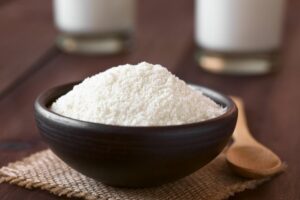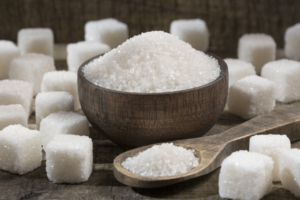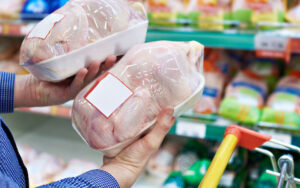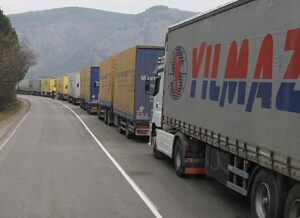
As of August 1, 2025, Ukraine has exhausted its ability to export dry milk to the European Union, with butter and milk fats next in line, whose quotas will be exhausted in the third decade of August, according to Ekonomichna Pravda, citing information from the Ukrainian Dairy Industry Association (SMU).
“As of August 1, there is no possibility of exporting dry milk originating in Ukraine to the EU within the quotas. According to the European Commission, as of July 30, the quota (including volumes expected to be allocated) was more than 91% filled, with only about 0.28 thousand tons remaining out of a quota of 2.92 thousand tons,” the publication said.
According to the industry association, the volumes of dry milk already awaiting clearance at the EU border exceed the available quota. From August 1, it no longer makes economic sense to send consignments of dry milk to the EU – they will have to be returned.
Quotas for imports of butter and milk fats to the EU will last a little longer. Currently, they are already more than two-thirds full. If butter exports to the EU remain at the same level in the coming weeks, the quota could be filled by the beginning of the third decade of August.
“The changes have already affected milk prices in Ukraine: in the second half of July, they rose by more than 5%. The reason for this is an attempt by processors to make a profit before the quotas are exhausted. This market trend may change if Brussels does not take new decisions on quotas,” the SMU emphasized.

The Czech Chamber of Food Industry has expressed concern over the European Union’s plans to significantly expand duty-free import quotas for Ukrainian agricultural products. A press release published on July 15 states that this threatens the Czech sugar industry. According to the Chamber, the quota for duty-free sugar imports from Ukraine to the EU could be increased from the current 20,070 tons to 100,000 tons — five times more. As a result, Czech producers fear a decline in self-sufficiency and a repeat of the situation with the closure of the plant in Hrušovany nad Evšovkou, which was linked to the influx of cheap imported sugar.
The Chamber’s president, Dana Večeržová, said: “If quotas continue to rise, we risk seeing the closure of new enterprises and ineffective investments not only in the sugar industry, but also in other strategic sectors.”
The decline in the Czech Republic’s self-sufficiency in sugar creates dependence on imports and devalues investments. Producers are calling on the government to abandon the quota increase and demand the introduction of restrictive mechanisms (automatic protective measures, price thresholds, and individual quotas) in negotiations with the European Commission.
Poland, Slovakia, Hungary, Bulgaria, and Romania have expressed their support for the Czech position. They signed a joint declaration calling on the European Commission to introduce protective measures for the most vulnerable sectors of the EU — sugar, grain, and meat.
In 2024, the Czech Republic imported 27.9 million kg of sugar from Ukraine (out of a total of 81.1 million kg) worth CZK 461 million. This is several times higher than the 2021 level of 3.7 million kg.
A fivefold increase in quotas for Ukrainian imports to 100,000 tons could seriously weaken the Czech sugar industry, threatening jobs and infrastructure.

The Ukrainian government has introduced a quota for exports of poultry and poultry by-products to the EU in the amount of about 137,000 tons starting July 1.
According to Cabinet of Ministers Resolution No. 612 of May 30, published on the government portal, the quota for the supply of poultry meat and edible offal to the EU, including chickens, geese, ducks, guinea fowl (UKTZED code 0207), is set at 133.28 thousand tons, and turkey meat and edible offal (UKTZED code 0207 24-27) at 3.76 thousand tons.
The Ministry of Economy will consider applications for licenses to export these goods to the EU within 10 days. Permits will be issued on the basis of applications and approvals provided by the Ministry of Agrarian Policy.
For the period of martial law, applicants shall prepare and submit documents electronically through the relevant information and communication systems (the Ministry of Economy’s electronic services portal, the Unified State Web Portal of Electronic Services).
The licensing regime for the export of quota goods to the EU is also mandatory if the non-resident counterparty is registered in the EU under a foreign economic agreement (contract).
At the same time, the volume of quotas approved for the commodity item “Meat and edible offal of poultry: poultry chickens, ducks, geese, guinea fowl”, excluding the reserve quota of 1400 tons for new exporters, and for the commodity “Turkey meat and edible offal of turkeys” is distributed by the Ministry of Agrarian Policy among exporters in proportion to the actual volume of their exports to the EU in the first quarter of 2024. Information on the actual export volumes of these products for the first quarter of 2024 must be provided by exporters to the Ministry of Agrarian Policy with supporting documents by June 25, 2024.
The reserve quota of 1400 tons will be distributed among exporters who did not export these products in the first quarter of 2024.
If there is an unused balance of the quota as of November 1, 2024, it is distributed among exporters in proportion to the actual exports of these products to the Member States of the European Union for the three quarters of 2024.
As reported, on May 13, the EU Council finally approved the extension of the autonomous trade measures for another 12 months – until June 5, 2025. At the same time, restrictions have been imposed on the duty-free supply of a number of agricultural products – poultry, eggs, sugar, oats, cereals, corn and honey – in the amount of the average export volume for the period from the second half of 2021 to the end of 2023.

The Cabinet of Ministers of Ukraine has set an immigration quota of 9,203 people for 2023.
According to the government decree No. 111 of February 7, the quota for relatives of citizens of Ukraine (full siblings, grandfathers and grandmothers, grandchildren) was 845 persons; for persons who were previously citizens of the country – 396 persons; for parents, spouses and minor children of immigrants – 2.055 thousand people; workers of science and culture, immigration of whom corresponds to interests of Ukraine – 850 people.
For persons who have carried out foreign investment activities in the Ukrainian economy in foreign convertible currency in an amount not less than $100 thousand immigration is established without restrictions.
In addition, this year under the quota can immigrate to Ukraine 5 thousand highly qualified specialists or workers who are in dire need of the economy of the country.
Among other things, a quota of 57 persons has been set for persons who have served in the Armed Forces of Ukraine for three or more years.
There is no quota for persons who have lived continuously in the territory of the state for three years from the date of their status as victims of human trafficking.
As reported, in 2021 the immigration quota was 9,818 persons, and in 2022 – 8,488 persons.

Ukraine will consider the possibility of opening a quota for the export of 100,000 tons of coal to Poland in September, Prime Minister Denys Shmygal said.
“On behalf of the President of Ukraine, at the request of the Polish side, Ukraine is ready to consider the possibility of opening quotas for coal exports to Poland. We are talking about 100,000 tons in September, which are now critically needed by our Polish partners,” he wrote on his Telegram channel.
Shmyhal specified that coal reserves in the warehouses of Ukrainian power plants amount to almost 2 million tons, which is 2.5 times more than a year ago. “Therefore, we are ready to lend a shoulder of support to our Polish friends,” he stressed.
The Prime Minister of Ukraine added that during the visit of his Polish counterpart Mateusz Morawiecki to Kyiv, the parties also discussed the restoration and commissioning of the Khmelnytsky NPP-Rzeszow power line.
“We planned to finish before December 14, but thanks to the acceleration of work, we can complete a week earlier. This will allow us to export an additional 1,000 MW to Poland. For our part, we ask Poland to assist in expanding export quotas within the framework of ENTSO-E,” Shmyhal said.
According to him, Ukraine expects that by the end of 2022 the amount of available transmission capacity in the direction of Slovakia, Romania and Hungary will increase from 300 MW by another 200-300 MW, and in the direction of Poland – over 1000 MW.
As reported, since mid-June 2022, Ukraine has set zero quotas for the export of all types of coal, except for coking coal, and on September 7, it completely banned the export of Ukrainian coal.
According to the State Customs Service, Ukraine’s coal exports for seven months of 2022 amounted to 450.6 thousand tons for $145.917 million, incl. to Slovakia – by $93.349 million, Poland – by $34.084 million, Hungary – by $15.919 million, other countries – by $2.565 million.

Ukraine and Bulgaria have agreed to expand bilateral cooperation in the field of road transportation.
According to the Ministry of Infrastructure of Ukraine, following a meeting of the mixed commission on international road transportation of goods and passengers, the parties agreed that in 2021 Ukrainian carriers will additionally receive 3,000 universal permits, of which 600 will be available at the points of issuance of permits starting next week. For 2022, the quota of permits has been increased by almost 25%, from 20,300 to 25,500. In addition, the universal permit form can be used for bilateral, transit and combined modes of transportation.
“The increase in the number of transport permits with Bulgaria is a good indicator of the development of our trade relations with the EU. We expect similar decisions from our other European partners. When we signed an Association Agreement with the EU in 2015, one of the key foundations for strengthening economic cooperation was that the dynamics of trade should not deteriorate. On the basis of this principle, the further policy of the Ministry of Infrastructure on international transportation will be formed,” Deputy Minister of Infrastructure Mustafa Nayyem is quoted as saying.